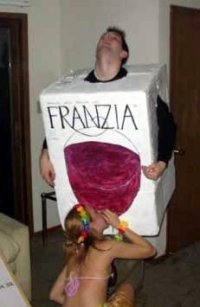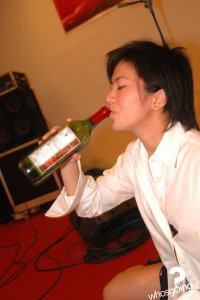NEW YORK (Reuters Life!) - Mention the name Robert Parker to those in the wine business and most will toast him while others will spit.
Makers of Bordeaux credit him and his 100-point rating system, which Americans have embraced, with revitalizing their livelihood.
But others blame Parker and his points for what is termed the "international" style that has overrun vineyards from Bordeaux to Healdsburg and Porto to Perth.
"It is wine that has no sense of place. You can take one sip or 10 and still not know where it is from," said Alice Feiring, author of the book "The Battle for Wine and Love or How I Saved the World from Parkerization."
"Basically, it's a formula, a recipe. The winemaker isn't working with what nature gave him, but a chemistry set and machines," she said.
Parker could not be reached for comment on Feiring's remarks.
But she quotes him in her book as saying, "When I started out I don't remember running into organically or biodynamically run vineyards. So the idea that you think there is a bland international style out there ... You can drive an 18-wheel truck through that argument."
Dismissing most of the Californian wines that sell for between $50 and $150 a bottle, she said they are wines that are passed off as high-art but are just a beverage.
And she described collectors who pride themselves on buying wines that rate a 96 or better from Parker as "just snobs who buy according to the label. They like to show the label. They'd wear it if they could."
Feiring prefers her wines to be made by traditional methods such as those used by Catherine Roussel and Didier Barrouillet of Clos Roche Blanche in France's Loire region. The couple produced a "Cot" or Malbec that makes her palate zing.
She despaired over the fate of Rioja, which like many other wine regions, has tried to plant grapes and blend wines that appeal to what they perceive to be Parker's palate in hopes of a higher rating.
She prefers instead the white, red and rose wines produced by Lopez de Heredia, elegant, old-style, long-aged and made pretty much as it has been for the last 130 years.
"The wines I advocate for are never going to be mass produced. They're like plays, not television shows or musicals ... They're individuals with a point of view," she said.
Parker's rating system started about the same time that Americans started to discover wine and global companies began buying family-owned vineyards. The U.S. share of the wine market has grown steadily over the past 15 years. In 2007 the country replaced Italy as the second largest wine consuming country.
Like Don Quixote, Feiring passionately battles to bring a sense of place to American palates. Her perfect winemaker is not a consultant, but a philosopher.
"He's part artist, part philosopher, part scientist. You need to be a philosopher to make great wine ... a philosopher with great timing. You have to time when to pick the grapes, you have to know that instinctively," she said.
Leslie Gevirtz
skip to main |
skip to sidebar




Enhance the pleasure that you get from wine by sharing your experiences, knowledge, news articles and facts about the elixir of the gods and bacchanalia on earth by emailing: bacchusforyou@bellsouth.net

ORIGINAL BACCHANALIAN CREATION

BACCHANALIAN WINE GLASS

I LOVE WINE, BUT I NEED TO LEARN HOW TO DRINK IT

Related Links
Blog Archive
-
▼
2008
(305)
-
▼
June
(103)
-
▼
Jun 04
(8)
- Gateway To Heaven
- Wine wars: the French strike back
- Wine-rating system leaves some with sour taste
- The Six Best Boxed Wines Out There
- Hundreds of thousands expected at Bordeaux wine fest
- Keep Drinking! Red wine compound seen protecting h...
- The Wines of India! "Red, White & Sultry"
- Latour's Engerer buys in the Rhone
-
▼
Jun 04
(8)
-
▼
June
(103)
How Much Did The Best Bottle of Wine You Ever Drank Cost?
CONTACT INFORMATION
TO SUBMIT A POST, TO BE PUT ON THE MAILING LIST, TO HAVE QUESTIONS ANSWERED, ETC.
EMAIL: